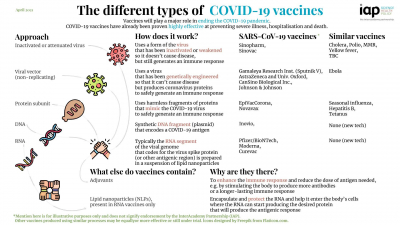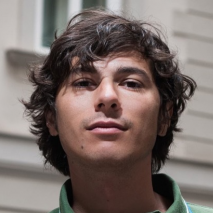


World Immunization Week aims to highlight the collective action needed to promote the use of vaccines to protect people of all ages against disease. As highlighted by the World Health Organisation (WHO), “the ultimate goal of World Immunization Week is for more people – and their communities – to be protected from vaccine-preventable diseases.”
This event is celebrated every year in the last week of April and World Immunization Week 2021 takes place from 24-30 April.
The theme for the 2021 World Immunization Week is “Vaccines Bring Us Closer”.
“Not only will vaccines bring us closer to good health and wellbeing – they will bring us closer to a brighter future of seeing friends, moving around freely, equal education, stronger economies, and so much more” explains the campaign's official website www.worldimmunizationweek.org.
This events offers a great opportunity to build public trust in the value of all vaccines and help build long-term support for immunization.
Pfizer/BioNTech, Moderna, AstraZeneca and Sputnik V are just a few of the COVID-19 vaccines already developed and approved for use. This is why the InterAcademy Partnership (IAP) decided to celebrate World Immunization Week by releasing a new infographic and shed some light on the different types of COVID-19 vaccines, how they are developed, and how they work.
Click here to download a high-resolution image and here for a PDF. This infographic is available also in French: download Les différents types de vaccins COVID-19 as a high-resolution jpeg or as a PDF.
The World Immunization Week hashtag is #VaccinesWork, and people and organizations around the world are already using it (see here) to show that vaccines help improve the health of everyone, everywhere throughout life.
Of course you can celebrate World Immunization Week by sharing the above infographic (remember to tag us as @IAPartership in your tweets and on LinkedIn, but you can also use the short videos we have prepared – extracted from our IAP Global Webinar on Countering Vaccine Hesitancy (see below) – to answer some of the most common and important questions (see below): let's work together to build solidarity and trust in vaccination as a public good that saves lives and protects health.
The IAP Global Webinar on Countering Vaccine Hesitancy shed light on the science behind the different COVID-19 vaccines and included concrete examples of how to counter vaccine hesitancy. It featured some of the most well-respected experts working with academies from all over the world, and we used it as a basis to prepare these bite-size videos that present aspects of vaccine science, regulation and the ‘infodemic’ in manageable nuggets of information (free for you to watch, listen and share them - you can find all our social media assets, including pre-canned posts, here on Trello).
Dr. Toni Gabaldón, Professor, Comparative Genomics Group Barcelona Supercomputing Centre (BSC-CNS), and Institute for Research in Biomedicine (IRB), Spain; Member, Member, IAP COVID-19 Expert Group; Alumnus, Spanish Young Academy.
Dr. Margaret (Peggy) A. Hamburg, Vice President, Global Biological Programs and Policy, Nuclear Threat Initiative; Co-Chair, IAP Health.
Prof. Herman Wasserman, Professor in Media Studies, University of Cape Town, Centre for Film and Media Studies, South Africa; Member, Academy of Science of South Africa (ASSAf).
Prof. Gagandeep Kang, Professor, Wellcome Trust Research Laboratory, Christian Medical College, Vellore, India; Co-Chair, IAP COVID-19 Expert Group; Member, Indian National Science Academy (INSA).
Dr. Biljana Gjoneska, Research Associate, Macedonian Academy of Sciences and Arts; Member, IAP Young Physician Leaders (YPL) Alumni Steering Committee.
